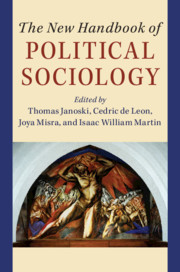Book contents
- The New Handbook of Political Sociology
- The New Handbook of Political Sociology
- Copyright page
- Dedication
- Contents
- Tables
- Figures
- Contributors
- Acknowledgments
- Introduction
- I Theories of Political Sociology
- 1 Power
- 2 Conflict Theories in Political Sociology
- 3 The Promise of Field Theory for the Study of Political Institutions
- 4 Culture in Politics and Politics in Culture
- 5 Political Sociology and the Postcolonial Perspective
- 6 Gender, State, and Citizenships
- 7 Theories of Race, Ethnicity, and the Racial State
- 8 Toward the Convergence of Culture and Political Economy?
- 9 Tasks for the Political Sociology of the Next Ten Years
- II Media Explosion, Knowledge as Power, and Demographic Reversals
- III The State and Its Political Organizations
- IV Civil Society: The Roots and Processes of Political Action
- V Established and New State Policies and Innovations
- VI Globalization and New and Bigger Sources of Power and Resistance
- Index
- References
6 - Gender, State, and Citizenships
Challenges and Dilemmas in Feminist Theorizing
from I - Theories of Political Sociology
Published online by Cambridge University Press: 22 February 2020
- The New Handbook of Political Sociology
- The New Handbook of Political Sociology
- Copyright page
- Dedication
- Contents
- Tables
- Figures
- Contributors
- Acknowledgments
- Introduction
- I Theories of Political Sociology
- 1 Power
- 2 Conflict Theories in Political Sociology
- 3 The Promise of Field Theory for the Study of Political Institutions
- 4 Culture in Politics and Politics in Culture
- 5 Political Sociology and the Postcolonial Perspective
- 6 Gender, State, and Citizenships
- 7 Theories of Race, Ethnicity, and the Racial State
- 8 Toward the Convergence of Culture and Political Economy?
- 9 Tasks for the Political Sociology of the Next Ten Years
- II Media Explosion, Knowledge as Power, and Demographic Reversals
- III The State and Its Political Organizations
- IV Civil Society: The Roots and Processes of Political Action
- V Established and New State Policies and Innovations
- VI Globalization and New and Bigger Sources of Power and Resistance
- Index
- References
Summary
The concept of citizenships, in the plural, reflects different research traditions in citizenship theorizing: citizenship as legal status in a sovereign state, as a bearer of rights and obligations; citizenship as participation (civic republicanism); and citizenship as social membership. Each of these enhances capabilities of individuals to become participants in political, economic, and social spheres of life. Citizenships as a concept also embraces practices: how these aspects of citizenship are experienced in everyday encounters and the relationships of power – in families, workplaces, welfare offices, social movements – and their variations in institutional contexts.
Keywords
- Type
- Chapter
- Information
- The New Handbook of Political Sociology , pp. 153 - 190Publisher: Cambridge University PressPrint publication year: 2020
References
- 2
- Cited by

